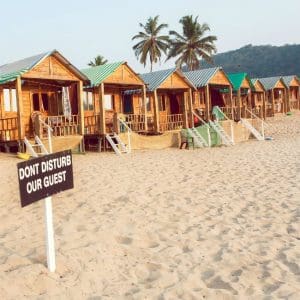 The Isle of Skye, Palma Majorca, Barcelona and San Sebastian, Rome, Dubrovnik and Venice. These have all been in the news recently as tourism destinations that are now seeing aspects of their tourism as more of a problem than a blessing. Is it just greed that is really the problem or a problem in managing the tourism phenomena?
The Isle of Skye, Palma Majorca, Barcelona and San Sebastian, Rome, Dubrovnik and Venice. These have all been in the news recently as tourism destinations that are now seeing aspects of their tourism as more of a problem than a blessing. Is it just greed that is really the problem or a problem in managing the tourism phenomena?
Local protests and anti-tourism rallies are expressions of frustration and concern that the number of visitors are getting out of hand. The source of the protests suggest that specific issues such as AirBnb, the pollution impact on historical sites as with Venice and Rome, or the sheer numbers of tourists arriving on theÊcruise ships in Dubrovnik are all symptoms of shifts in tourism behaviour. To stand in a queue forÊfive hours to enter the Palace of Versailles, illustrates the conflict between the visitors desire to access the popular site and the pressures on managing the visitor experience. The Secretary General of the UNWTO, Taleb RifalÊis quoted as saying Òa very serious situation that needs to be addressed in a serious wayÉ Tourism can be the best ally to conservation, preservation and the community if managed correctly. It should not be given up for the sake of mismanagementÓ.
AirBnB, is often subject to criticism from hoteliers, but in these recent cases the source of the criticism are local residents. It is where landlords are turning their residential properties into unlicensed, unregulated short-term holiday accommodation rentals for increased profit. These properties are often in residential districts and this in turn is significantly restricting the availability of long-term renting for local people and seasonal workers. Within those communities the visitors often reported antisocial behaviour causes additional local tension. In Barcelona for example the city has employed more accommodation inspectors and started to check all holiday rental properties, as they believe something approaching 50 per centÊare unlicensed.
Where tourists, by sheer volume of number, are overwhelming destinations, this impacts on both the built and the natural environment. It puts additional pressure not just on natural resources but also on all of the utilities and public services, from water to sewerage and rubbish. Local people just get the sense that their location is being Òtaken overÓ by the tourist who are not showing their home the courtesy and respect they feel it deserves.
The example of cruise liners in places such as Dubrovnik and Venice demonstrates the negative social and economic impacts that compound the very visible dominance of the visitors on the streets and transport systems. In many cases visitors stay for only a few hours, not really spending money that contributes to the local economy. They come to see, to photograph and touch but not to buy, other than the occasional souvenir. Few will really access accommodation, food and beverage because that is all provided and been paid for on the cruise liner.
The dangers in all this are obvious. Too many tourists spoil the tourism experience for those very tourists coming to enjoy it. The real authentic tourism experience is the combination of the history, geography, attractions and the people. Making tourism a gawky sideshow rather than a total experience of food, culture local values and traditions, belittles both the destination and the tourist.
The anti-tourism reaction is considered by some to be more than just a frustrated reaction to over demand but a more concerning shift to do with politics. Europe is certainly, currently, experiencing a broader disconnect between politicians and the people they are elected to serve. People are now more inclined to vent their anger and their frustration through action as they do not see politicians accepting or taking responsibility for providing solutions.
As the UNWTO Secretary General goes on to say, Òit (tourism) should not be given up for the sake of mismanagement. Ensuring that tourism is an enriching experience for visitors and hosts alike demands strong, sustainable tourism policies, practices and the engagement of national as well as local governmentsÓ. It should also fully engage with the local communities and the tourists themselves.
Some destinations are beginning to work out their own management solutions, including regulation and licensing of all short-term holiday accommodation to better control the number of beds and visitors. Licensing would also ensure that all accommodation complies with the appropriate health, safety and fire regulations and could be centred into specific zones to better manage the situation. The wider use of visitor taxes may also provide a method of regulating numbers but also provide much-needed income to support the local infrastructure and development of local services.
The need is for imaginative measures that ÒmanageÓ the tourism experience for all parties in such a way that protects and enhance its very raison d’tre.
By Professor Peter A Jones MBE
Professor Peter Jones is the Dean of the eHotelier Academy. With aÊdistinguishedÊcareer in hospitality, education and training, Peter has been involved with national and international projects with clients involved in hospitality education.ÊPeter is a Director of the Edge Hotel School and of Hotel Future, a new education and training initiative in Greater Manchester and is a Visiting Professor at the University of Derby. He was also awarded a Member of the Order of the British Empire for services to the hospitality industry.
Want to keep up to date with industry news? Click here to subscribe toÊeHotelier’s dailyÊe-newsletter.

 The Isle of Skye, Palma Majorca, Barcelona and San Sebastian, Rome, Dubrovnik and Venice. These have all been in the news recently as tourism destinations that are now seeing aspects of their tourism as more of a problem than a blessing. Is it just greed that is really the problem or a problem in managing the tourism phenomena?
The Isle of Skye, Palma Majorca, Barcelona and San Sebastian, Rome, Dubrovnik and Venice. These have all been in the news recently as tourism destinations that are now seeing aspects of their tourism as more of a problem than a blessing. Is it just greed that is really the problem or a problem in managing the tourism phenomena?



















